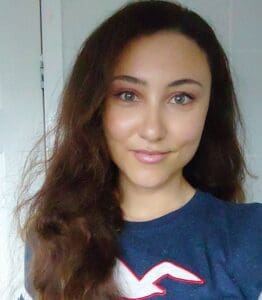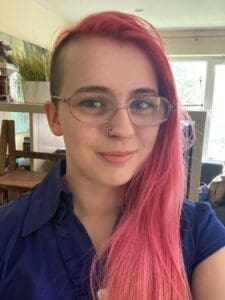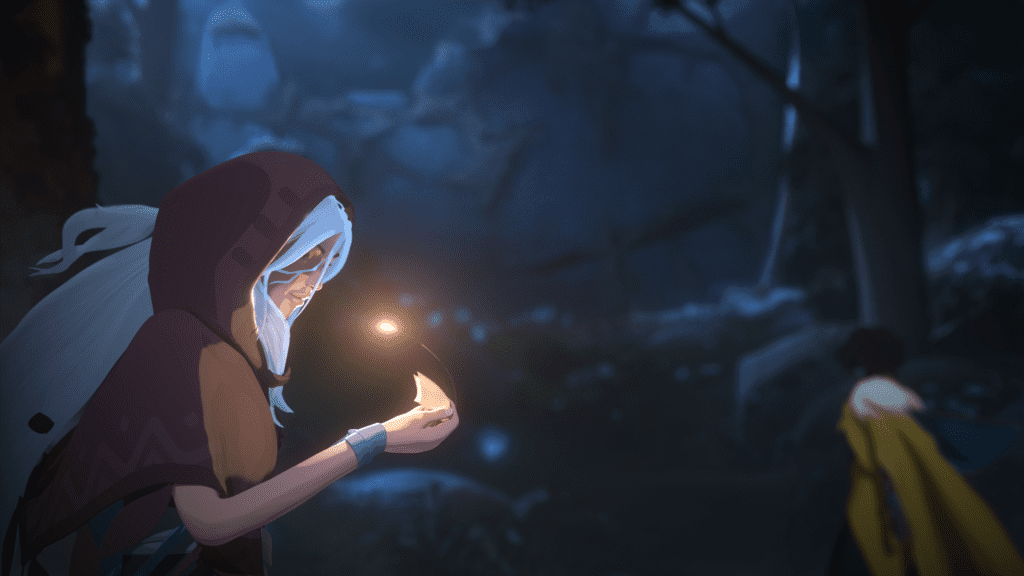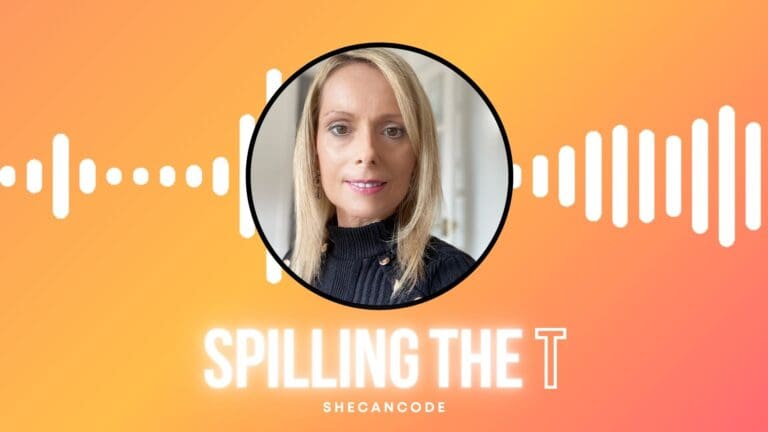Read their stories here:
Firstly, why don’t you tell us a little bit about the career journey you took to get to your current full-time role at Rare?

Lorna: I’ve had an incredibly varied career to date! From leaving college to become a wrestler at 18, to becoming a flight attendant, to waitressing at a casino. Then in 2016, I grew restless and wondered what my future would be like if I stayed at the casino. There was an open day at my local college, so I went along and decided to apply to their Software Engineering & Game Development course. I’d never programmed anything in my life (apart from some HTML in notepad in the late 90’s).
I was accepted onto the course, studied hard and graduated with a First with Commendation in 2019, and landed an internship position at Rare! After that year I was a contractor for a year and was then offered a Full-Time role in June 2021.
Sarah: Well, I went to study Computer Games Technology at the University of Portsmouth so I could learn how to make games. While in my second year, I managed to land an internship at Rare, and during my internship I was fortunate to get a job offer for when I graduated. I went back to uni to finish my degree and came back to Rare afterwards; I’ve been here for about 18 months now and I’m loving it!
What was it about tech, and specifically games programming, that captured your interest as a career path?
Sarah: I have been playing games for most of my life and I discovered programming during my A-levels. I realised that with code you have the power to make anything you want, which is cool! Games have always brought me happiness and I loved the idea that I could bring those experiences to others. There’s also a lot of variety in programming, which appealed to me. For example, sometimes you get to feel like a detective hunting down code problems or you get to be creative and design a system, it never gets boring!

Lorna: I’ve always loved video games and was practically raised by my SNES and PlayStation. I never thought about being a games programmer though because it just never occurred to me that it was a job. Then in 2015 Five Nights at Freddy’s became extremely popular and the life story behind the creator resonated with me and I thought “hmm, maybe I can make games?” and as I mentioned, it was in 2016 that I applied to my local college. Asking myself that question actually gave me a 9-month head start to start learning how to program before the course kicked off in 2016.
Why did you decide to do an internship? What do you think are the benefits?
Lorna: As programming was so completely different from any of my previous jobs, I suffered from severe confidence issues (still do). I felt like I wasn’t “good enough” to apply for a graduate role and instead, an intern position would suit me more as you’re expected to not get everything right. I felt this was the perfect “way in” for me.
Sarah: I wanted to give myself the best chance of securing a job right after uni and I knew that industry experience would make me stand out, so I had to try! I thought, even if I didn’t get an internship, the process of writing my CV, cover letters and doing interviews would be valuable and I might get some advice on how to improve. Doing an internship helped me get industry contacts and knowing I had the experience to get a job when I graduated made my final year less stressful. I learnt things constantly, about programming of course but also about effective communication, how to break down complicated work and lots more. Plus, having a break from university deadlines was great!
So how did you find out about the Rare Internship?
Lorna: I started looking at studios for my work experience in Year 2 and noticed that Rare offered an internship. I couldn’t apply at that time as my course didn’t allow a gap year and the work experience needed was only 100 hours. Rare was pretty much part of my childhood (I’m a huge Rare fangirl) so the thought of working for Rare was always in my mind when I started the degree.
Sarah: Google! I was just googling for internships when I found Rare. They stood out to me because they offered an engine programming internship. It sounded interesting and was a bit different to the more gameplay-focused internships I had seen.
What was the application process like?
Lorna: Very easy. The website said to be creative with your application, so I made a short 3-minute video for my cover letter and submitted that along with a portfolio and CV. I remember being extremely nervous for the phone interview and then the onsite was a like a dream as I drove down the Rare driveway and saw the Banjo and Dinosaur Planet statues.
Sarah: At the time it was a bit scary, but it was also fun, and I learnt a lot. I sent off my CV and cover letter, then I had an informal video interview where we chatted about me and my experience. From there I was invited on site for a day where we got to see the studio and I did a more technical interview. Everyone was lovely and helped me get over my nerves at every stage!
What were your internship highlights?
Sarah: Getting to help hire the new interns! After going through the process, myself, it was awesome to be on the other side of it. My other highlight must be working on the enchanted spyglass for the Sea of Thieves anniversary update, it’s the thing I can point at and say, “I helped make that!”

Lorna: Seeing my name added to the credits for Sea of Thieves! It’s been 2 and half years now and I still don’t consider myself a “real” engineer; it’s very surreal.
What tips would you give to prospective and current interns, to really make the most of an internship?
Lorna: Please don’t work outside of hours and please do ask us questions, no matter how stupid you think they are. I know it’s scary to approach your colleagues, they’re so smart and I felt like I was wasting their time but you never are; please talk to us.
Sarah: Be curious about everything and ask lots of questions. You’re working at a games studio surrounded by industry professionals, make use of that!
Tell us a little bit about the work you’re now doing at Rare, as a full-time employee?
Sarah: I work on our engine team, we handle a lot of central tech work across our 2 projects, Sea of Thieves and Everwild. We’re constantly updating Sea of Thieves and consoles have a limited number of resources so we have a limited amount of memory and processing power we can use. So, we do a lot of optimisation work to make sure we can keep adding new content and that the game will continue to run smoothly. Right now, I’ve been focusing on some animation programming work, investigating ways for us to save memory and continue adding in new animations.
Lorna: I’m currently helping to organise and run the Intern process this year! This is something I’ve been wanting to do since I started, and I wanted to give back to the process that helped change my life. I’ve also been leading my own work instead of simply having tasks handed to me. Generating my own work and managing my overall workload is difficult but a new challenge I’ve not faced before. It can be difficult saying no to work but knowing your limits and managing your time is really important.

What do you think are some of the myths that surround the world of games programming?
Lorna: You need to be a hacker/genius/programmer since you were 5 to become a games programmer; That’s not the case at all! You can do it at any time.
Sarah: That programming in general is super hard and you must be some sort of genius to do it. It’s not true! It can be challenging but I do believe anyone can learn to code. You can get game engines like Unity and Unreal for free, there are loads of resources to learn from and Unreal even has a visual scripting language which can be a less daunting way of learning some of the basic principles. After that, it’s just practice!
How do you think we can get more women into the world of tech?
Lorna: Let them know earlier on in life that it’s a valid career choice and something you CAN do. I wish in primary school we had programming lessons. I think then I would’ve made the connection between my love for video games and making my own games.
Sarah: I think role models are important. Showing women, especially young women that there are awesome women who already work in tech and there are lots of different jobs they could do. I think organisations like SheCanCode are great for this! Also, I think we need to provide more young women with the opportunity to just have a go at things like coding. Whether that’s through classes, weekend events, or summer schools.
Getting them involved will help them see that they can do it, it can be fun, and they can make awesome things!
If you’re thinking about an internship, check out Rare’s internship programme: https://www.rare.co.uk/careers/rare-internships-2022








